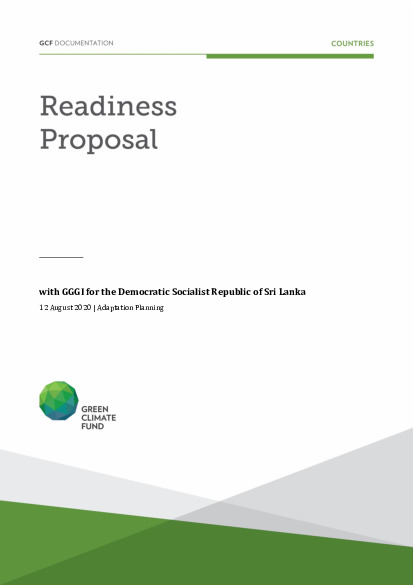Strengthen the Process and Capacity of Implementation of National Adaptation Plan of Sri Lanka

Strengthen the Process and Capacity of Implementation of National Adaptation Plan of Sri Lanka
Sri Lanka, as a small island and a developing nation, is highly vulnerable to the adverse effects of climate change. Occurrences of natural disasters due to extreme weather conditions such as prolonged droughts, flash floods and landslides deprive lives and livelihoods of people. Thus, building resilience of vulnerable communities and ecosystems over climate change effects within a broader framework of sustainable development remains the country’s priority.
Towards the Government’s overall vision on tackling climate change impacts, the National Climate Change Policy (NCCP) adopted in 2012 provides guidance and directions to address the adverse impacts of climate change efficiently and effectively. The proposed project will contribute to achieving the policy objectives to sensitize and make aware the communities periodically on the country’s vulnerability to climate change; take adaptive measures to avoid/minimize adverse impacts of climate change to the people, their livelihoods and ecosystems; enhance knowledge on the multifaceted issues related to climate change in the society and build their capacity to make prudent choices in decision making; develop the country’s capacity to address the impacts of climate change effectively and efficiently; and mainstream and integrate climate change issues in the national development process.
In identifying gaps and areas of support, the Government has undertaken the climate change adaptation planning process through three-stages. This involves preparing sector vulnerability profiles for key sectors which outline the status of the sectors and the main potential climate change risks facing Sri Lanka; adopting a participatory process for the above through working groups comprising a range of stakeholders as well as individual consultations with key people to refine content of the sector vulnerability profiles and to identify and prioritize areas for future investment; and synthesizing these sector-based analyses into one cohesive national adaptation strategy, which includes a clear program for priority action and investment based on clearly defined strategic priorities. Over 500 stakeholders representing a cross section of government institutions, national NGOs, professionals, and academia covering a wide range of sectors were engaged in the process. These analyses and stakeholder engagement provided for the development of the National Climate Change Adaptation Strategy 2011-2016 and the National Adaptation Plan for Climate Change Impacts in Sri Lanka 2016-2025 (NAP).
The sector vulnerability profiles have been developed for the following key groupings of sectors, where climate vulnerabilities are expected to be critical in the Sri Lankan context: agriculture and fisheries, water, health, urban development, human settlements and economic infrastructure, biodiversity and ecosystem services. As the sector vulnerability profiles evolved and extensive consultations were carried out, several recurrent observations formed the foundation for establishing strategic priorities:
- Climate change-related risks cannot be considered in isolation. They are often linked to and will likely aggravate existing development disparities and problems.
- Problems are rarely isolated clearly within one sector—cross sectoral linkages are common
- A multidisciplinary approach is critical in order to effectively understand and address climate change concerns
- Integrated solutions and adaptation measures straddling multiple sectors are necessary to address risks to key national development initiatives